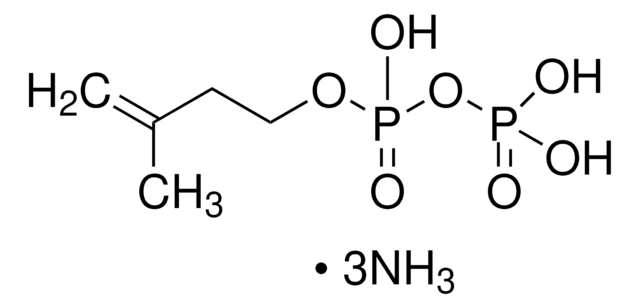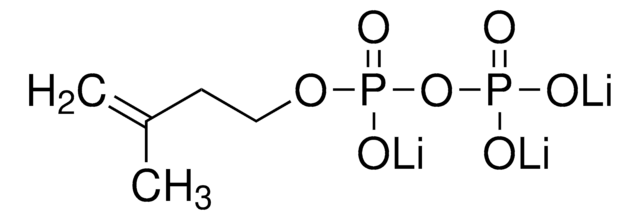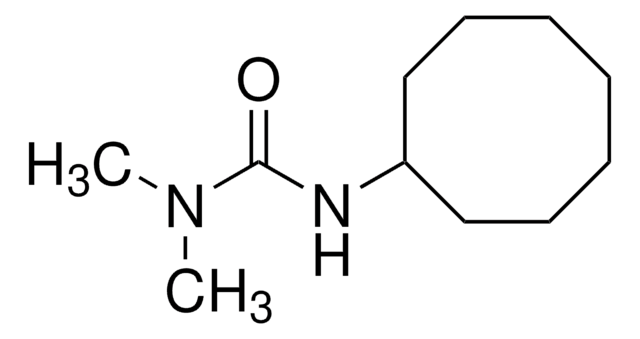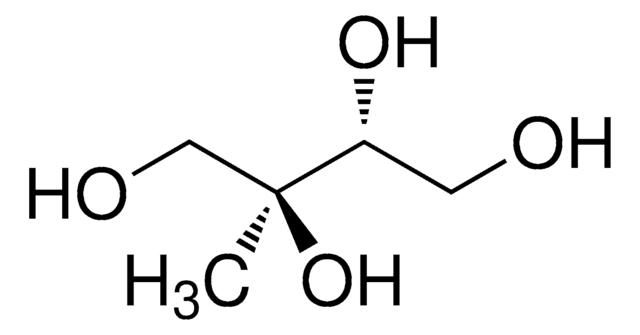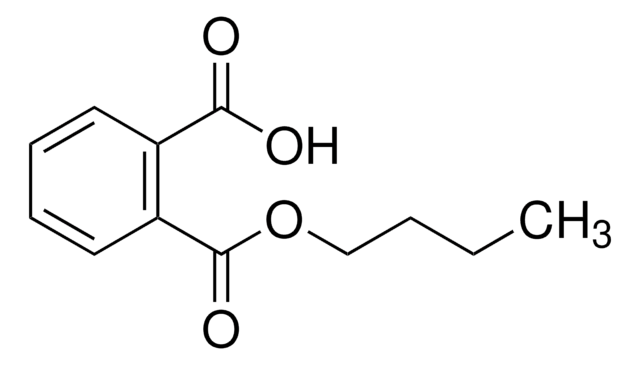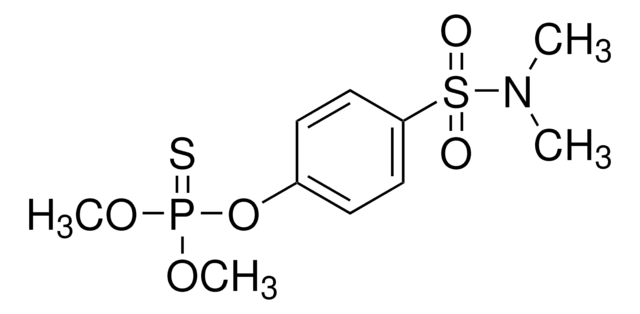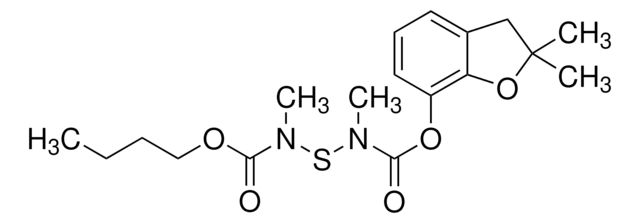52131
2-C-Methyl-D-erythritol 4-phosphate lithium salt
≥98% (TLC)
Sinónimos:
MEP
Iniciar sesiónpara Ver la Fijación de precios por contrato y de la organización
About This Item
Fórmula empírica (notación de Hill):
C5H11O7P · xLi+
Número de CAS:
Peso molecular:
214.11 (free acid basis)
UNSPSC Code:
12352106
PubChem Substance ID:
NACRES:
NA.25
Productos recomendados
assay
≥98% (TLC)
storage temp.
−20°C
SMILES string
O=P(O)(O)OC[C@H](O)[C@@](O)(C)CO.C
InChI
1S/C5H13O7P/c1-5(8,3-6)4(7)2-12-13(9,10)11/h4,6-8H,2-3H2,1H3,(H2,9,10,11)/t4-,5+/m1/s1
InChI key
XMWHRVNVKDKBRG-UHNVWZDZSA-N
Application
2-C-Methyl-D-erythritol 4-phosphate (MEP), the product of reductoisomerase IspC and first committed MEP pathway intermediate, is used to study the non-mevalonate MEP pathway for the biosynthesis of isoprenoids. MEP is used as a precursor for the synthesis of 4-diphosphocytidyl-2-C-methyl D-erythritol (CDP-ME), a key intermediate of the non-mevalonate pathway.
Biochem/physiol Actions
Metabolite intermediate specific to the non-mevalonate MEP pathway, generally found in prokaryotes, as precursor to isoprenoids as well as non-isoprenoids like vitamins. As this pathway is not present in humans, it is of interest for the development of bacterium-specific drugs in the search for treatments of infectious diseases.
Packaging
Bottomless glass bottle. Contents are inside inserted fused cone.
Storage Class
11 - Combustible Solids
wgk_germany
WGK 3
flash_point_f
Not applicable
flash_point_c
Not applicable
Elija entre una de las versiones más recientes:
¿Ya tiene este producto?
Encuentre la documentación para los productos que ha comprado recientemente en la Biblioteca de documentos.
Sina I Odejinmi et al.
Tetrahedron, 68(43), 8937-8941 (2012-10-11)
2-C-methyl-D-erythritol-4-phosphate (MEP) is a key chemical intermediate of the non-mevalonate pathway for isoprenoid biosynthesis employed by many pathogenic microbes. MEP is also the precursor for the synthesis of 4-diphosphocytidyl-2-C-methyl D-erythritol (CDP-ME), another key intermediate of the non-mevalonate pathway. As this
Hyungjin Eoh et al.
Tuberculosis (Edinburgh, Scotland), 89(1), 1-11 (2008-09-17)
Tuberculosis (TB) is still a major public health problem, compounded by the human immunodeficiency virus (HIV)-TB co-infection and recent emergence of multidrug-resistant (MDR) and extensively drug resistant (XDR)-TB. Novel anti-TB drugs are urgently required. In this context, the 2C-methyl-d-erythritol 4-phosphate
Andréa Hemmerlin et al.
Progress in lipid research, 51(2), 95-148 (2011-12-27)
When compared to other organisms, plants are atypical with respect to isoprenoid biosynthesis: they utilize two distinct and separately compartmentalized pathways to build up isoprene units. The co-existence of these pathways in the cytosol and in plastids might permit the
J Kipchirchir Bitok et al.
ACS chemical biology, 7(10), 1702-1710 (2012-07-31)
There is significant progress toward understanding catalysis throughout the essential MEP pathway to isoprenoids in human pathogens; however, little is known about pathway regulation. The present study begins by testing the hypothesis that isoprenoid biosynthesis is regulated via feedback inhibition
Sinéad Heuston et al.
Microbiology (Reading, England), 158(Pt 6), 1389-1401 (2012-04-03)
Isoprenoid biosynthesis is essential for cell survival. Over 35 000 isoprenoid molecules have been identified to date in the three domains of life (bacteria, archaea and eukaryotes), and these molecules are involved in a wide variety of vital biological functions. Isoprenoids
Nuestro equipo de científicos tiene experiencia en todas las áreas de investigación: Ciencias de la vida, Ciencia de los materiales, Síntesis química, Cromatografía, Analítica y muchas otras.
Póngase en contacto con el Servicio técnico
